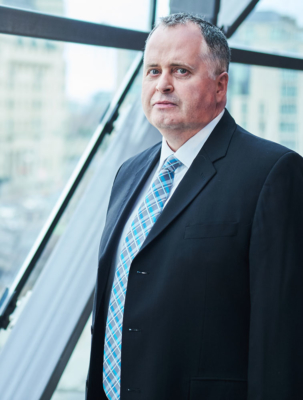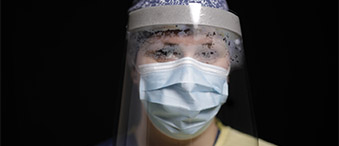A melanoma diagnosis

Several years ago, Ian McDonell, a Staff Sergeant with the Ottawa Police and father of three had just lost his father to cancer and his brother was dying of melanoma. Ian’s wife insisted he see his physician to check out a mole on his back. It turned out to be an ulcerated nodular malignant melanoma – an aggressive form of skin cancer.
Ian had surgery to remove it along with a lymph node from his left groin. Several weeks later, he had a lymph node removed from his armpit. Following these surgeries, he had no signs of cancer, but due to his family’s history, Ian was at high risk for relapse.
Sobering news
Ian was feeling well, but during a standard monitoring visit in June 2017, his CT and MRI scans showed sobering news. He had half a dozen tumours in his groin and abdomen, and three more tumours metastasized to his brain. Ian’s cancer was stage 4.
Given the severity of the findings, Dr. Michel Ong at The Ottawa Hospital suggested an aggressive approach – a recently approved immunotherapy treatment.
Unmasking cancer
Scientists have tried for decades to stimulate the immune system to attack cancer cells. But the game changer was the discovery that cancer cells make key molecules, called immune checkpoint proteins, that suppress immune cells and prevent them from attacking the cancer. These immune checkpoint proteins cloak the cancer from the immune system. New drugs called immune checkpoint inhibitors remove this cloak and allow immune cells called T-cells to naturally attack and destroy the cancer.
“The idea of chemotherapy is to kill off cancer directly,” said Dr. Ong. “There are potential side effects, because chemotherapy tries to poison the cancer.
“Immunotherapy does not directly affect the cancer itself. Instead, immunotherapy unmasks the cancer to your immune system by flipping some switches on T-cells, and the body’s own immune system does the rest.” – Dr. Michael Ong

CyberKnife treatment
Ian started on a combination of two immunotherapies given intravenously in the chemotherapy unit at The Ottawa Hospital’s Cancer Centre. He also underwent CyberKnife radiotherapy treatment where high doses of radiation were directed at his brain tumours. He bravely continued with the second round of immunotherapy, but was so sick, he had to be taken off the treatment and started on steroid medications to slow down the immune system. Ian felt better, but his immunotherapy was on hold.
Shrinking tumours
When Ian began to develop weakness in his face, he worried his cancer was getting worse. It wasn’t. Scans showed one tumour had shrunk from 25 to 10 mm, and another had shrunk from eight to four mm.
Dr. Ong recommended trying a single immunotherapy rather than two, and while the treatment made Ian very sick, it did the trick.
Two months later, the results of a PET scan, MRI, and a CT scan showed that he was tumour-free. All trace of his cancer was gone.

Advances in immunotherapy
When Dr. Ong first met Ian in 2013, options for immunotherapy or targeted chemotherapy weren’t available. Thanks to incredible advances in immunotherapy, there is now hope.
“In the last few years, we’ve gone from having very poor options to having many effective options for melanoma. That’s because cancer therapy continues to develop at a very rapid pace,” said Dr. Ong. “We, at The Ottawa Hospital, are constantly participating in practice-changing clinical trials. The standard of care is constantly changing, as it should. We are continually trying to push the limits of cancer treatment.”
The Ottawa Hospital is a leader in cancer immunotherapy research, both in terms of developing new therapies and in offering experimental treatments to patients. Currently, there are approximately 70 active cancer immunotherapy clinical trials being conducted at the hospital involving nearly 700 patients. The hospital also hosts a national network for immunotherapy research and has developed a number of unique immunotherapies made directly of cells and viruses.
Hope for the future
Because of successful immunotherapy treatments, patients like Ian are now planning a future of living cancer-free.
“When the provincial exams for police services came up, I said, ‘I’m gonna write it, because I’ve got a bit of hope now.’” said Ian.
More importantly, in addition to his career plans, immunotherapy has allowed Ian to plan for the future with his family and a chance to watch his daughters grow up.
Hear more about oncologist Dr. Michael Ong’s work with immunotherapy.
The Ottawa Hospital is a leading academic health, research, and learning hospital proudly affiliated with the University of Ottawa.




